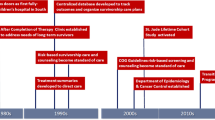Abstract
Late effects of multi-modality treatments may result in organ compromise or new primary cancers for a growing population of long-term survivors of cancer. It is estimated that there will be 180000–220000 childhood cancer survivors living in the United States in the year 2000. This number of survivors warrants program planning specific to their needs. Add to this the number of patients diagnosed with cancer as adults who have reached 5-year survival status, and the total population of long-term survivors of cancer justifies special programs to deal with the issues of survivorship. This paper addresses several questions: (a) What are the needs of cancer survivors? (b) Can these needs be met through specialty survivor clinics? (c) What are the benefits of survivor follow-up clinics? (d) Should survivor clinics for children and adults become standard care? The clinic structure and objectives, and daily procedures for a follow-up clinic in New York State are presented as one model of care. Benefits for a free-standing clinic also are discussed as well as financial considerations and directions for research.
Similar content being viewed by others
References
American Cancer Society (1994) Cancer facts and figures-1994. ACS, Atlanta
Bleyer WA (1990) The impact of childhood cancer on the United States and the world. CA Cancer J Clin 40:355–367
Bleyer WA, Griffin TW (1980) White matter necrosis, mineralizing microangiopathy, and intellectual abilities in survivors of childhood leukemia: associations with central nervous system irradiation and methotrexate therapy. In: Gilbert HA, Kagan AR (eds) Radiation damage to the nervous system. Raven Press, New York, pp 155–174
Bushkin E (1993) Signpost of survivorship. Oncol Nurs Forum 20:869–874
Delaat CA, Lampkin BC (1992) Long-term survivors of childhood cancer: evaluation and identification of sequelae of treatment. CA Cancer J Clin 42:263–282
Gambosi JR, Ulreich S (1990) Recovering from cancer: a nursing intervention program recognizing survivorship. Oncol Nurs Forum 17:215–219
Hobbie WL (1986) The role of the pediatric oncology nurse specialist in a follow-up clinic for long-term survivors of childhood cancer. J Assoc Pediatr Oncol Nurs 3:9–12, 24
Hobbie WL, Hollen PJ (1993) Pediatric nurse practitioners specializing with survivors of childhood cancer. J Pediatr Health Care 7:24–30
Loescher LJ, Welch-McCaffrey D, Leigh SA, et al (1989) Surviving adult cancers. I. Physiologic effects. Ann Intern Med 111:411–432
Meadows AT, Hobbie WL (1986) The medical consequences of cure. Cancer 58 [Suppl]:524–528
Moore IM, Packer RJ, Karl D, Bleyer WA (1994) Adverse effects of cancer treatment on the central nervous system. In: Swartz CL, Hobbie WL, Constine LS, Ruccione KS (eds) Survivors of childhood cancer: association and management. Mosby, St Louis, pp 81–95
Mullan F (1985) Seasons of survival: reflections of a physician with cancer. N Engl J Med 313:270–273
Swartz CL, Hobbie WL, Constine LS (1994) The establishment of the follow-up clinic. In: Swartz CL, Hobbie WL, Constine LS, Ruccione KS (eds) Survivors of childhood cancer: association and management. Mosby, St Louis, pp 367–389
Welch-McCaffrey D, Hoffman B, Leigh SA, et al (1989) Surviving adult cancers. II. Psychosocial implications. Ann Intern Med 111:517–524
Author information
Authors and Affiliations
Rights and permissions
About this article
Cite this article
Hollen, P.J., Hobbie, W.L. Establishing comprehensive specialty follow-up clinics for long-term survivors of cancer Providing systematic physiological and psychosocial support. Support Care Cancer 3, 40–44 (1995). https://doi.org/10.1007/BF00343920
Issue Date:
DOI: https://doi.org/10.1007/BF00343920




